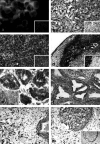Immunohistochemical characterisation of the monoclonal antibody BLCA-38 for the detection of prostate cancer
- PMID: 15449043
- PMCID: PMC11032839
- DOI: 10.1007/s00262-004-0527-7
Immunohistochemical characterisation of the monoclonal antibody BLCA-38 for the detection of prostate cancer
Abstract
Background: Monoclonal antibodies (MAbs) can be used to detect, image and treat cancers. This study aimed to characterise the binding of BLCA-38 MAbs to human prostate cancer cell lines, human prostate cancer biopsy samples and normal tissues to enable future targeted studies.
Methods: BLCA-38 antigen expression on cancer lines was determined by flow cytometry; that on patient specimens from normal tissues and cancers was tested by immunohistochemistry using fresh frozen tissues or paraffin-embedded tissues that had undergone antigen retrieval.
Results: Cell surface BLCA-38 antigen expression was seen on DU-145, PC-3, PC-3 M and PC-3 M-MM2 prostate cancer lines, but LNCaP, MDA PCa 2a or MDA PCa 2b lines were negative. Other human lines, including 8/12 bladder cancer and A431 vulval epidermoid cells, but not breast cancer lines, expressed BLCA-38 antigen. Staining occurred in glandular epithelial cells in the majority of frozen, and paraffin-embedded prostate cancer tissues and was occasionally seen in prostatic intraepithelial neoplasia (PIN). No staining was observed in normal cadaver tissues or in benign areas from various other cancer tissues.
Conclusions: The BLCA-38 antibody binds to the majority of human prostate cancers but not to normal cells, and has potential for targeting novel therapies in patients with this disease.
Figures


Similar articles
-
Biodistributions of intact monoclonal antibodies and fragments of BLCA-38, a new prostate cancer directed antibody.Cancer Immunol Immunother. 2004 Jun;53(6):533-42. doi: 10.1007/s00262-003-0460-1. Epub 2004 Jan 13. Cancer Immunol Immunother. 2004. PMID: 14722669 Free PMC article.
-
Immunohistochemical evaluation of the expression of prostate tumor-association markers in the nude mouse human prostate carcinoma heterotransplant lines PC-82, PC-EW, and PC-EG.Prostate. 1990;17(4):301-16. doi: 10.1002/pros.2990170406. Prostate. 1990. PMID: 1701249
-
Expression of the prostate-specific membrane antigen.Cancer Res. 1994 Apr 1;54(7):1807-11. Cancer Res. 1994. PMID: 7511053
-
An immunohistochemical analysis of a newly developed, mouse monoclonal p40 (BC28) antibody in lung, bladder, skin, breast, prostate, and head and neck cancers.Arch Pathol Lab Med. 2014 Oct;138(10):1358-64. doi: 10.5858/arpa.2013-0342-OA. Epub 2014 Feb 14. Arch Pathol Lab Med. 2014. PMID: 24528495
-
Immunohistochemistry in diagnostic surgical pathology of the prostate.Semin Diagn Pathol. 2005 Feb;22(1):88-104. doi: 10.1053/j.semdp.2005.11.001. Semin Diagn Pathol. 2005. PMID: 16512601 Review.
Cited by
-
Safety and tolerability of Miltuximab® - a first in human study in patients with advanced solid cancers.Asia Ocean J Nucl Med Biol. 2021 Spring;9(2):86-100. doi: 10.22038/AOJNMB.2021.55600.1386. Asia Ocean J Nucl Med Biol. 2021. PMID: 34250138 Free PMC article.
-
Development of a reliable assay to measure glypican-1 in plasma and serum reveals circulating glypican-1 as a novel prostate cancer biomarker.Oncotarget. 2018 Apr 27;9(32):22359-22367. doi: 10.18632/oncotarget.25009. eCollection 2018 Apr 27. Oncotarget. 2018. PMID: 29854284 Free PMC article.
-
Near-Infrared Molecular Imaging of Glioblastoma by Miltuximab®-IRDye800CW as a Potential Tool for Fluorescence-Guided Surgery.Cancers (Basel). 2020 Apr 16;12(4):984. doi: 10.3390/cancers12040984. Cancers (Basel). 2020. PMID: 32316186 Free PMC article.
-
Stable Upconversion Nanohybrid Particles for Specific Prostate Cancer Cell Immunodetection.Sci Rep. 2016 Nov 22;6:37533. doi: 10.1038/srep37533. Sci Rep. 2016. PMID: 27874051 Free PMC article.
-
Bee Venom Components as Therapeutic Tools against Prostate Cancer.Toxins (Basel). 2021 May 7;13(5):337. doi: 10.3390/toxins13050337. Toxins (Basel). 2021. PMID: 34067049 Free PMC article. Review.
References
-
- Kohler Nature. 1975;256:495. - PubMed
-
- Walker J Urol. 1989;142:1578. - PubMed
-
- Bazinet Cancer Res. 1988;48:6938. - PubMed
-
- Leroy M, Teillac P, Rain JD, et al. Radioimmunodetection of lymph node invasion in prostatic cancer: the use of iodine-123(123I)-labeled monoclonal-prostatic acid phosphatase 227A F(ab)2 antibody fragments in vivo. Cancer (Phila) 1989;64:1. - PubMed
-
- Lopes Cancer Res. 1990;50:6423. - PubMed
MeSH terms
Substances
LinkOut - more resources
Full Text Sources
Other Literature Sources
Medical

